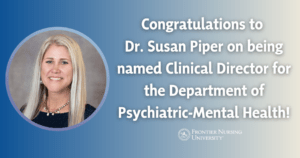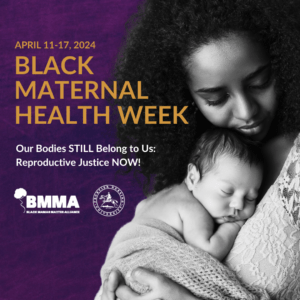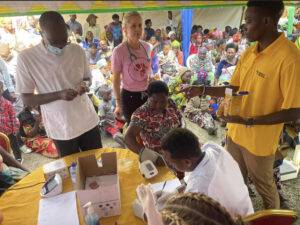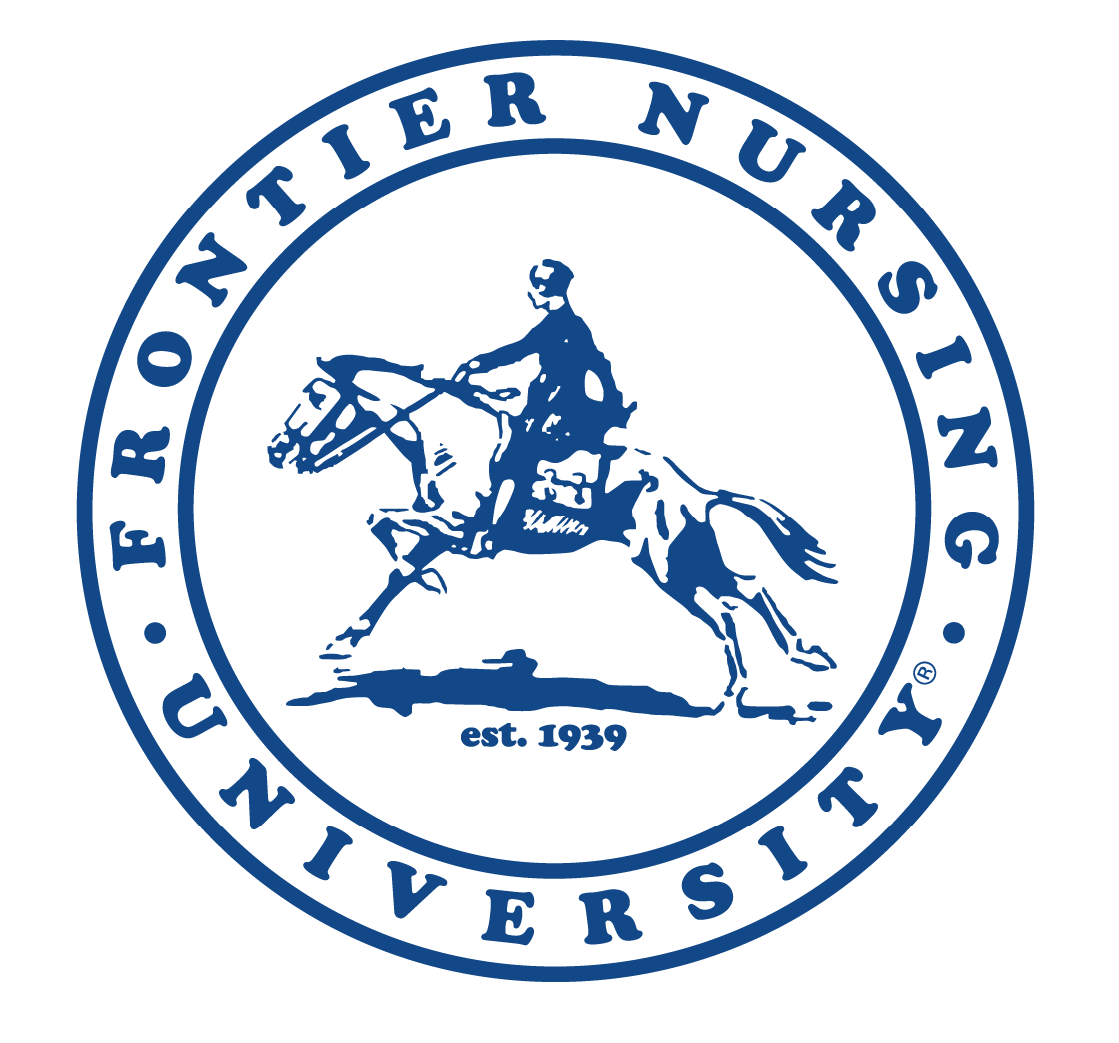 Are you considering a career in the healthcare field? Do you have a passion for serving women and families? A passion for providing holistic and patient-centered care? If the answer is yes, consider becoming a Certified Nurse-Midwife (CNM).
Are you considering a career in the healthcare field? Do you have a passion for serving women and families? A passion for providing holistic and patient-centered care? If the answer is yes, consider becoming a Certified Nurse-Midwife (CNM).
A nurse-midwife is a primary health care provider to women of all ages throughout the lifespan. CNMs offer gynecologic and family planning services, as well as preconception, pregnancy, childbirth, postpartum and newborn care. They also provide primary care such as conducting annual exams, writing prescriptions, and offering basic nutrition counseling.
Frontier Nursing University (FNU) is the country’s premier university for nurse-midwifery education. Our distance education model is ideal for prospective nurse-midwives and nurse practitioners who do not want to leave their home communities to obtain a graduate education to fulfill their professional goals.
Should you consider a career as a nurse-midwife? Here are a few reasons we think you should:
Demand is Growing for Nurse-Midwives
The need for nurse-midwives in the healthcare arena is rapidly growing as health care organizations across the country are embracing collaborative models of care and adding nurse-midwives to health care teams. The Bureau of Labor and Statistics predicts job opportunities for nurse-midwives will grow 31 percent by 2026 – a rate that’s more than four times that of the national average for all occupations. If you are looking for an occupation that is ripe with opportunity, nurse-midwifery is a great option.
Nurse-Midwives are Strong Advocates for Women and Families
Nurse-midwives have the opportunity to build deep, lasting relationships with the women they serve. Their unique skill sets have been shown to improve quality and decrease costs associated with birth thus making CNMs valuable assets in all birth settings. Nurse-midwives also serve as excellent advocates for patients, which is particularly important as more and more women seek to be active participants in their healthcare and birth choices. This includes choices for their birth experience and their birthplace.
Robin McHugh, a 2016 FNU graduate, works primarily with Amish and Mennonite women and families.
“A few days ago, I attended a beautiful home birth way out on a ranch. The other children I had also delivered came running in, excited to see their new sibling. It’s a joy to serve a mother and a family through each birth and get to watch that family enlarge – it’s so exciting and fulfilling,” said Robin.
Prior Childbirth Experience is Not Required
Prior labor and delivery nursing experience is not required to become a nurse-midwife at FNU. Students from a variety of backgrounds including doula and primary care have had success completing FNU’s programs. Preceptors work with students to customize their clinical experience, ensuring they get the required experience in the areas they need it most.
FNU offers a graduate Nurse-Midwifery specialty track that can be pursued full- or part-time while completing a Master of Science in Nursing or a Post-Graduate Certificate. After earning an MSN or certificate, you have the option to transition to the Companion Doctor of Nursing Practice program via a direct admission process.
You Can Complete your Program in Your Home Community
With FNU’s distance education model, your home community serves as your classroom. Our flexible nurse-midwifery program allows you to complete courses online and work closely with practicing nurse-midwives during your clinical experience. At the same time, FNU coursework is designed to connect you to the larger FNU community.
Our distance education model allows us to reach rural and underserved communities nationwide with students in all 50 states. Through these online learning experiences, you will build relationships that can help you complete your coursework and graduate ready to make a difference in your corner of the world.
The Nurse-Midwifery Experience is Priceless
While each birth is special, there are moments in the work of a nurse-midwife that are absolutely unforgettable. Kim Samson, a 2016 FNU graduate, said her favorite birth was with a woman who planned to have an unmedicated birth.
“She got to a point where she wanted an epidural and I said, ‘I will not deny you an epidural if that’s what you really want, but I know your goals and I would like you to try this first.’ So I had her stand up and dance with her husband next to the bedside and thirty minutes later, we had a baby. It was a supportive and encouraging experience for me that, yes indeed, this process works.”
So should you become a nurse-midwife? Here’s what our alumni have to say about it:
“Absolutely. I don’t think there’s another profession on the planet that can even come close. We talk about empowering women but they empower us. Their stories are amazing. Each woman we serve is amazing in her own way and we get to bear witness to the most intimate, special moment of her life,” said Robin.
Latrice said, “I want to encourage everyone during the challenging times of your education that we would all certainly do this again. Keep pressing on and you’ll find the same joys we have.”
To learn more about the nurse-midwifery program at FNU, visit Frontier.edu/Nurse-Midwife.
Watch Robin, Latrice and Kim share their stories with Dr. Tonya Nicholson, Associate Dean of Midwifery and Women’s Health at FNU, in the video below!
What is a Certified Nurse-Midwife (CNM)?
Certified Nurse-Midwives (CNMs) are educated in two disciplines: midwifery and nursing. They earn graduate degrees, complete a midwifery education program accredited by the Accreditation Commission for Midwifery Education (ACME), and pass a national certification examination administered by the American Midwifery Certification Board (AMCB) to receive the professional designation of CNM. Certified Midwives (CMs) are educated in the discipline of midwifery. They earn graduate degrees, meet health and science education requirements, complete a midwifery education program accredited by ACME, and pass the same national certification examination as CNMs to receive the professional designation of CM.





 Dr. Nikia Grayson, DNP, MSN, MPH, MA, CNM, FNP-C, FACNM (she/her) is a trailblazing force in reproductive justice, blending her expertise as a public health activist, anthropologist, and family nurse-midwife to champion the rights and health of underserved communities. Graduating with distinction from Howard University, Nikia holds a bachelor’s degree in communications and a master’s degree in public health. Her academic journey also led her to the University of Memphis, where she earned a master’s in medical anthropology, and the University of Tennessee, where she achieved both a master’s in nursing and a doctorate in nursing practice. Complementing her extensive education, she completed a post-master’s certificate in midwifery at Frontier Nursing University.
Dr. Nikia Grayson, DNP, MSN, MPH, MA, CNM, FNP-C, FACNM (she/her) is a trailblazing force in reproductive justice, blending her expertise as a public health activist, anthropologist, and family nurse-midwife to champion the rights and health of underserved communities. Graduating with distinction from Howard University, Nikia holds a bachelor’s degree in communications and a master’s degree in public health. Her academic journey also led her to the University of Memphis, where she earned a master’s in medical anthropology, and the University of Tennessee, where she achieved both a master’s in nursing and a doctorate in nursing practice. Complementing her extensive education, she completed a post-master’s certificate in midwifery at Frontier Nursing University.









 Dr. Tia Brown McNair is the Vice President in the Office of Diversity, Equity, and Student Success and Executive Director for the Truth, Racial Healing, and Transformation (TRHT) Campus Centers at the American Association of Colleges and Universities (AAC&U) in Washington, DC. She oversees both funded projects and AAC&U’s continuing programs on equity, inclusive excellence, high-impact practices, and student success. McNair directs AAC&U’s Summer Institutes on High-Impact Practices and Student Success, and TRHT Campus Centers and serves as the project director for several AAC&U initiatives, including the development of a TRHT-focused campus climate toolkit. She is the lead author of From Equity Talk to Equity Walk: Expanding Practitioner Knowledge for Racial Justice in Higher Education (January 2020) and Becoming a Student-Ready College: A New Culture of Leadership for Student Success (July 2016 and August 2022 Second edition).
Dr. Tia Brown McNair is the Vice President in the Office of Diversity, Equity, and Student Success and Executive Director for the Truth, Racial Healing, and Transformation (TRHT) Campus Centers at the American Association of Colleges and Universities (AAC&U) in Washington, DC. She oversees both funded projects and AAC&U’s continuing programs on equity, inclusive excellence, high-impact practices, and student success. McNair directs AAC&U’s Summer Institutes on High-Impact Practices and Student Success, and TRHT Campus Centers and serves as the project director for several AAC&U initiatives, including the development of a TRHT-focused campus climate toolkit. She is the lead author of From Equity Talk to Equity Walk: Expanding Practitioner Knowledge for Racial Justice in Higher Education (January 2020) and Becoming a Student-Ready College: A New Culture of Leadership for Student Success (July 2016 and August 2022 Second edition).